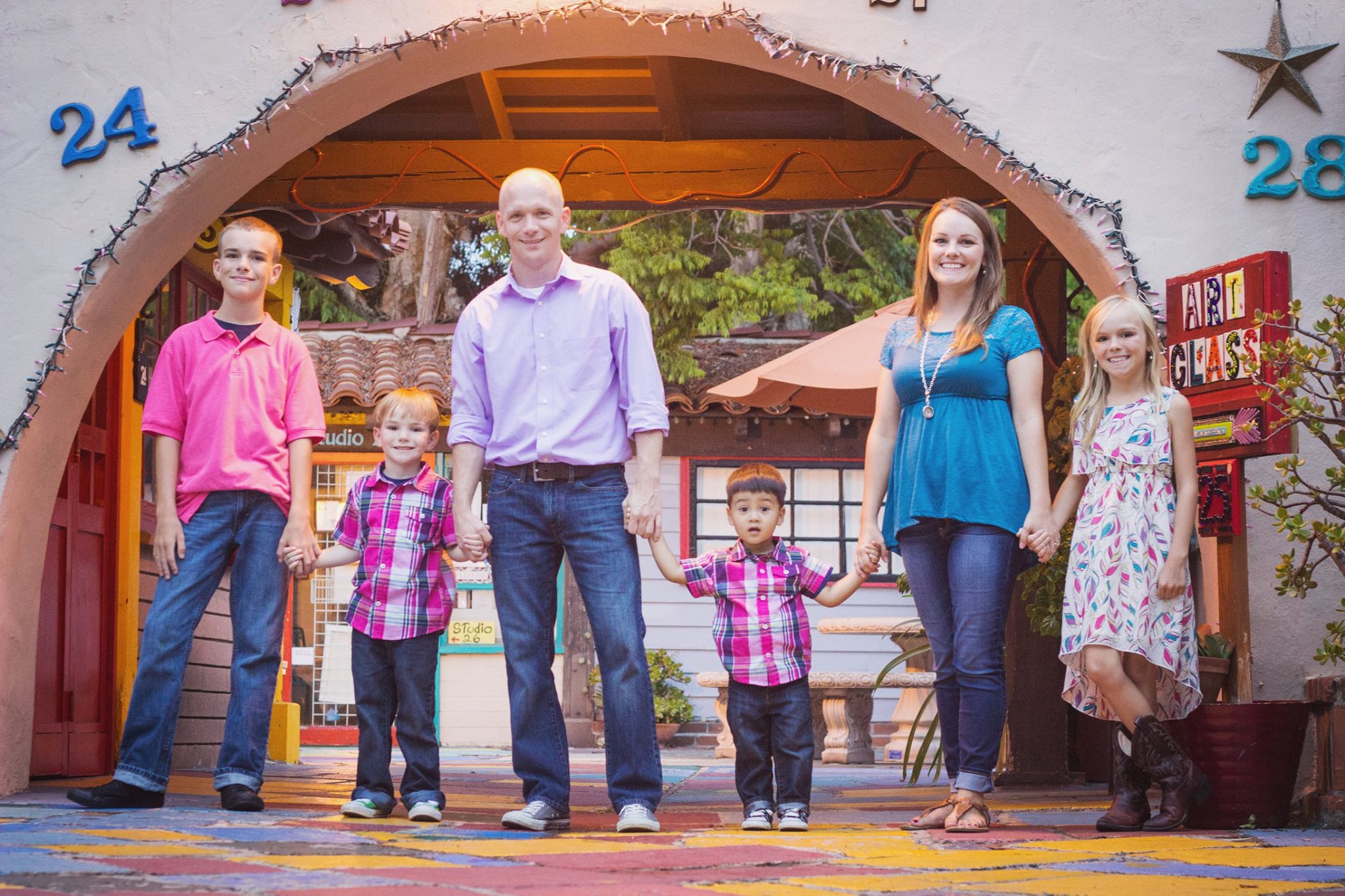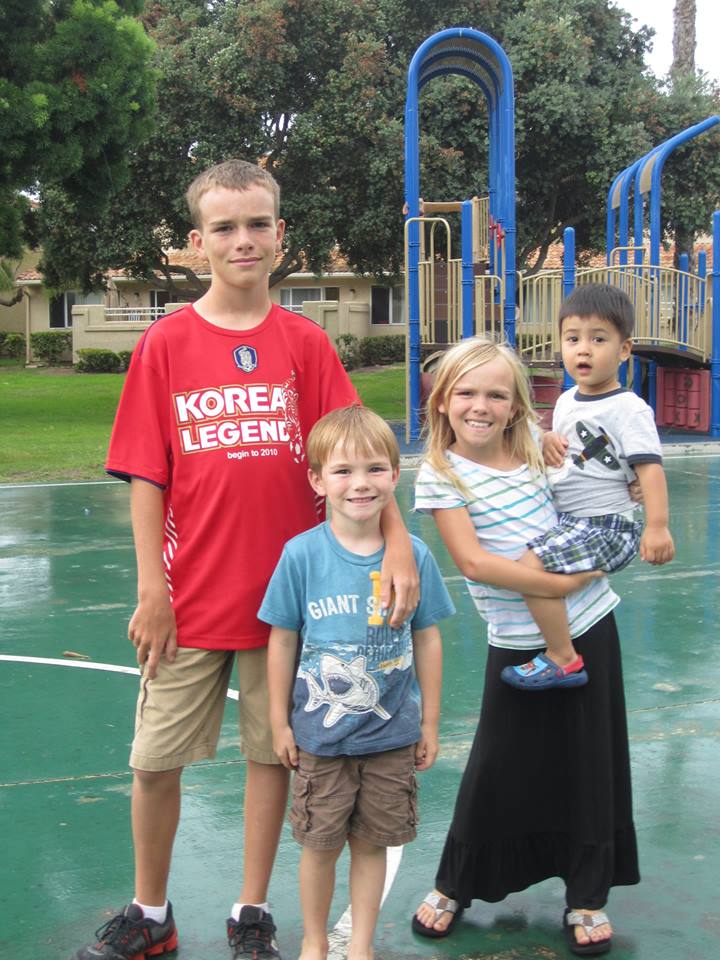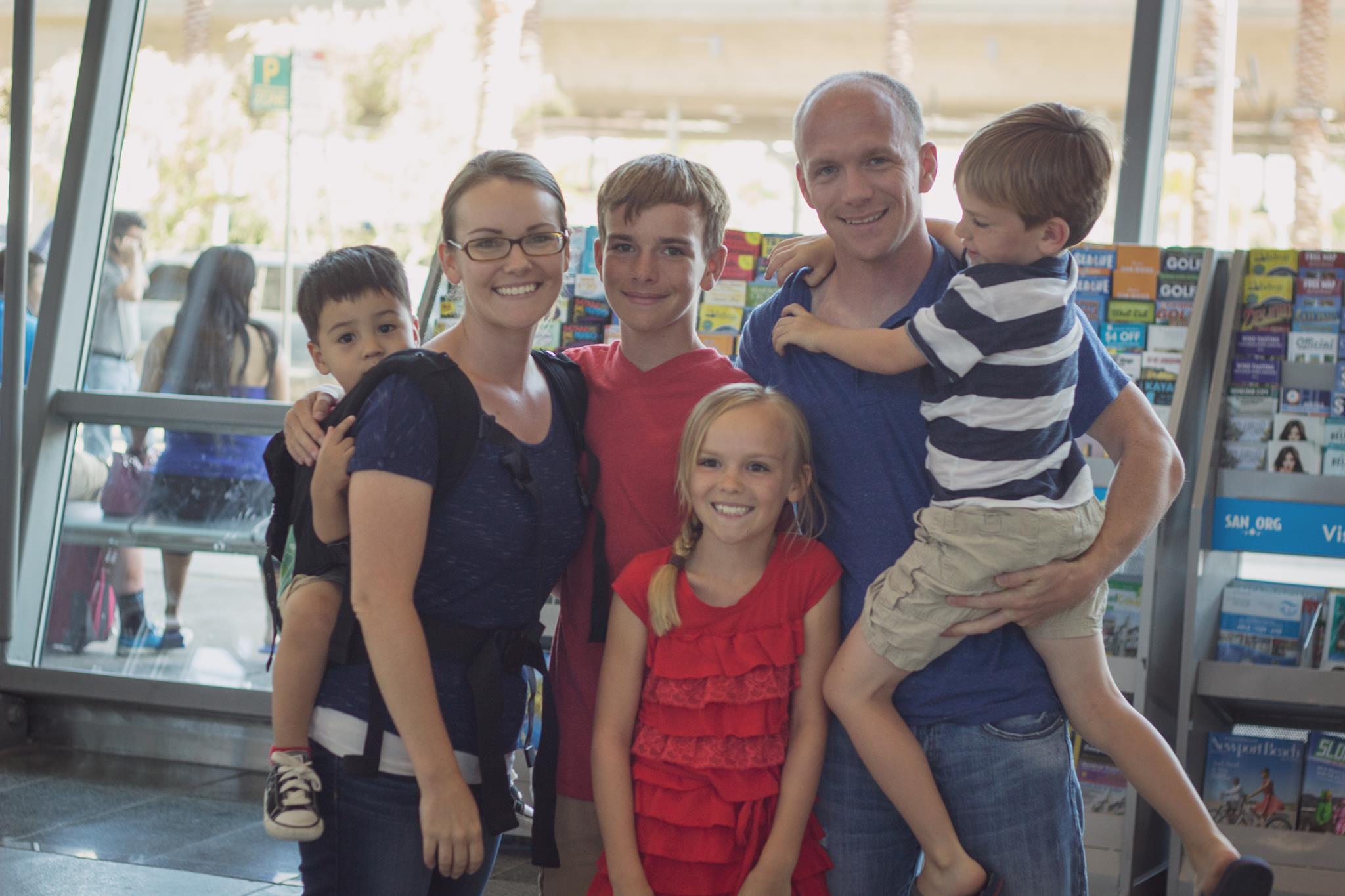
On a Wednesday morning in November, a little boy watches his favorite cartoon. Every so often, he brings a toy to his mom, sits beside her for a moment, and then returns to his toddler play. He shares a snack with a new friend and together they giggle and watch Pororo, the Little Penguin, communicating with each other in the way only 2 year olds can. The little boy’s name is Silas. He was recently adopted from South Korea by Jeff and Kenya Wilbanks, a local military family with hearts so big, they traveled the world to bring home their little boy. It’s been a journey of more than 2 years in the making.
Jeff and Kenya, who are both originally from Alabama, have always known they wanted to adopt. The couple has three biological children as well, and began thinking about their adoption journey while stationed in Mississippi.
“We always knew we would adopt,” Kenya explains. “We just always assumed it would be when our other kids were older.”
Their pastor at the time had recently adopted two children from South Korea. While watching them go through the process, Kenya knew it was time to start thinking about adopting themselves.
“I thought, if they can do it, so can we. What are we waiting for?”
So she prayed — for weeks. And slowly, she says, she started to feel even more strongly about their decision. She talked with her husband, and they decided it was time. They would soon transfer to San Diego, and begin the adoption process.
But where do you even start when diving into the adoption process? Kenya explains that synching up with a network of people who have “been there, done that” is immensely important. She explains that there are several support groups and networks for adoptive families to tap into and can be very helpful when determining what kind of adoption to pursue domestic or international, which agency to work with, how to financially, and emotionally, prepare for such a monumental change.
“We knew going in that we wanted to adopt from South Korea, and use the same agency as our pastor did Holt International.”
Holt International was founded in 1955 by an Oregon couple who sought families for children orphaned by the Korean War. Established overseas for more than 50 years, Holt opened the door for international adoption.
In July 2012, the Wilbanks’ submitted their adoption paperwork. When they arrived to their new duty station in California, the process was briefly delayed until they got settled in their new home. Then all the requisite paperwork, background checks, clearances, health information and social worker visits ensued.
Kenya explains that families initially receive a welcome call when you “look good on paper” and after all background checks have been completed. They were told that, in their case, it could be another 7-10 months before they would be matched with a child. Jeff and Kenya waited only five days before receiving the call from the agency director.
They were the words Kenya had been waiting to hear. Jeff and Kenya were matched with Silas, who at the time was just over 6 months old, on December 7, 2012. Kenya remembers sitting at her computer constantly hitting “Refresh” until she was able to view the file and finally see the boy who would soon become her son.
The financial requirements for adoption are staggering, and Kenya quickly became a really good fundraiser. Between program fees, two trips to Seoul and the other associated costs, the costs were high. They hosted online auctions, sold t-shirts and hosted Thirty-One (a direct sales organization) parties.
“We usually always had two fundraisers going on at once.”
They were also eligible for a reimbursement of a small portion of the costs to adopt through the military once Silas was home. They found grants to apply for as well as interest-free loans. Kenya believes that it is truly important for potential adoptive families to know there are resources available. “You make it work,” says Kenya.
In addition to the financial preparations, Kenya found early on it was important to find emotional support from other adoptive families who had been through the process. And as she embarked down her path, soon she was one to provide support to others who came behind her.
“There’s a real bond among adoptive families. They are there for you. They fight for you. They pray for you. You cheer them on when they get the call even though you’re still waiting. It’s like having a supernatural friendship.”
Movement Feelings
During their adoption process, Kenya recalls having what she describes as “movement feelings” at various times along the way. Unlike a woman who is preparing to give birth who can feel her baby move, Kenya didn’t have that same physical connection to Silas. Still, she experienced these somewhat unexplainable moments where she felt incredibly connected to this little boy she still had never met.
“Somewhere in this huge universe there was this connection with someone. Something was happening. I felt it in my soul.”
When she experienced a “movement feeling” she would feel it for days. The first time was this inexplicable peace and knowledge that it was time for them to move forward with the adoption; when they finally decided “Okay, it’s time to do this.” She says knew it was God allowing her feel this. She would later find out the significance of the timing of these peaceful feelings it was one week before Silas was born.
First Meeting
“There’s an adoption quote that says the first time I saw you, my soul said Oh, there you are,’” Kenya recalls, with tears in her eyes.
The Wilbanks family made two trips to Seoul for the adoption; the first was in the spring of 2014 when they were first able to meet Silas in person, nearly a year and a half after finding out they had been matched with this little boy.
“The first time I saw him, time stood still. It was like he and I were the only two people in the world.”
Kenya recalls that when Silas saw them, he recognized them as they had established and kept in contact with him through pictures and recordable story books. Kenya learned how to speak some Korean and was able to communicate a long list of basic toddler words with Silas. Silas called them Omma and Appa, the Korean words for “mother” and “father” and called his siblings Hyung and Noona for “brother” and sister.”
Bringing Silas Home
Kenya’s “movement feelings” continued, this time as she and her other children were on their way to music class. Suddenly, while still in the car, a moment came that took her breath away and she knew that Silas was finally legally hers and she was his. The next day, they received the call that the adoption decree had been issued and Silas was officially theirs. The date? June 17th, the same day and time that Kenya was driving to music class.
Kenya explains that in addition to the feelings of joy that come with adopting, there is also, at times, an overwhelming amount of guilt, fear and anxiety. Silas wasn’t a newborn. He would, by the time of the adoption, be a two year old who knew his surroundings. He had remained with a consistent foster family his entire life. Kenya knew the transition would be tremendously difficult for everyone. She would be bringing home a grieving toddler.
“Adoption is beautiful. But it is born out of loss.”
The second trip to Seoul took place a couple weeks later, and Jeff and Kenya took custody of Silas on June 29. The handover was a bit fast and confusing, almost a blur. His foster mom, with whom the Wilbanks still keep in touch, quickly said a loving goodbye as Jeff and Kenya left in a cab with their son.
“It was the saddest thing I have ever seen,” Kenya remembers. “All I could do was just hug him and tell him it was going to be okay.”
Life with Silas
It’s been nearly 5 months since Silas has been home, and he has transitioned surprisingly well. While he grieved tremendously at first for his foster family, Kenya explains that he has adapted very well, to so many changes in his life. He had never sat in a car seat before. He is hearing (and speaking) a new language and eating new foods. He is exposed to new germs. And he’s getting to know, and love, a new family.
Silas is very friendly, loving and social. When he arrived in his new home in Coronado, he jumped out of the van and ran up to the front door like he had been there a thousand times. He ran inside and got to the carpet, sat down and took off his shoes, something that was customary to him in Korea. Then he ran over to the toys and started playing.
“He just came in like he owned the place. He was home.”
Silas likes to eat. He has adjusted to new foods very well, although Kenya regularly prepares Korean dishes for the family as well, and the other kids have learned to love it too.
He has adjusted to learning a new language very well, saying his first English word before they left Korea. After about 12 hours with Silas, Kenya recalls being able to have a very basic conversation with him in Korean, noting that it was important for her to learn his native language as a way to establish his trust.
Kenya says there are still hard days. Jeff left for deployment a month after Silas came home. There have been struggles still, but that’s normal. Adoption is a lifelong journey.
“Adoptive families need a lot of support after they bring their child home. Toddlers grieve. It’s hard. They still need you as much as a newborn, if not more,” Kenya explains.
When Silas first came home, they kept his world small, slowly introducing him to people and places. This was a way for Silas to not feel overwhelmed and to know who are the close people in his life.
Kenya explains that while adoption isn’t natural, it is her wish that society would be more sensitive to it.
“We need to normalize it. Adoptive parents are just parents,” she says. “We don’t belong on a pedestal. We’re not saints. Adopted kids are just kids. They don’t need to be treated differently.”
The Wilbanks plan to travel to Korea every couple of years as Silas shows interest, so he can maintain his Korean heritage.
“We want him to be proud of Korea. You can’t go to Korea and not see all of the strength and ability to overcome.”
But for now, his journey home is complete.
Visiting with the Wilbanks family, it is rather apparent how much this boy is loved. He’s been wanted, prayed for, and loved by a family a half a world away since nearly the day he was born.
“I think Silas is the bravest person I know,” says his mom. “When I find myself feeling fearful, I remember what he endured and how strong he was and how willing he was to love. I can’t be scared of anything. As hard and as ugly as some days are, he’s my hero.”
———–
Mary Douglas
Staff Writer
eCoronado.com
Have a story you want to share? Contact us.





